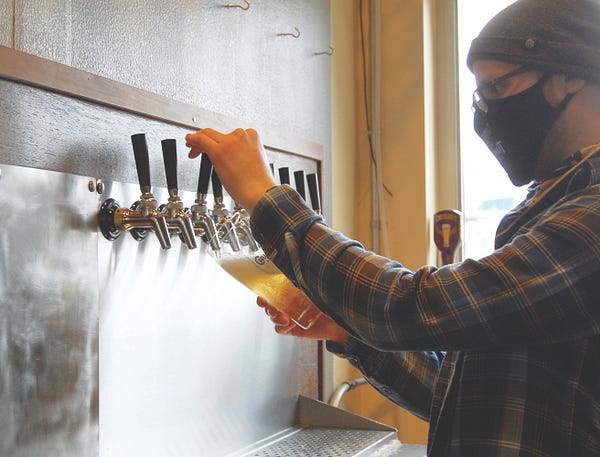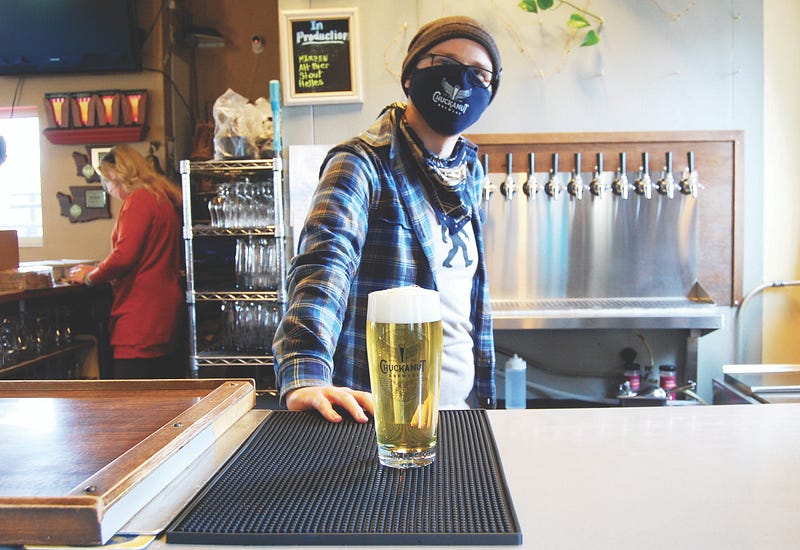How Do You Run A Restaurant In A Pandemic?
This podcast is a supplement to a story examining the impacts of the pandemic on the greater service sector in Bellingham, Wash. Click here to read it!
Podcast by Garrett Rahn


[embed]https://soundcloud.com/klipsun-magazine/how-do-you-run-a-restaurant-in-a-pandemic[/embed]
Podcast transcript
Garrett Rahn: Hello and welcome to Klipsun Out Loud, podcasts from the Spring 2021 edition of Western Washington University’s award-winning student magazine, Klipsun. This edition’s theme is Empathy. I’m your host, Garrett Rahn, and today, we are going to be talking about some of the changes that the pandemic has created in the service industry over the last year. I recently had the pleasure of speaking with the Restaurant Operations Manager for Chuckanut Brewery, Spencer Ebel about some of those changes. Adapting to the ever-changing landscape of pandemic regulation has become a large part of his work.
Spencer Ebel: It’s been kind of a long journey on that aspect because the information is changing constantly, so you have to kind of stay ahead of the game, and I think that’s one of the things that we’ve tried to really maintain here at Chuckanut, is trying to stay a couple steps ahead of it.
Garrett: At first, back in June when the restaurant was first allowed to reopen from the initial lockdowns, there were very few restrictions in place.
Spencer: There was no mask mandate in place by that point. There was no indoor restriction, it was just kind of make sure your tables are spaced apart and you have, you know, less people.
Garrett: From then on however, the states and the different restaurant associations began frequently updating regulations to combat the spread of COVID-19. In the interest of preparing over reacting, Ebel says that Chuckanut has been slow to ease up on restrictions whenever the authorities tell them that they can.
Spencer: I understand that that’s been a little bit of a challenge for some of our customers because we do have a little bit more restrictions in place them some places do at any given point.
Garrett: Right now and for the past few colder months, Chuckanut has restricted its service to its covered patio area, and done away with wait table service, instead having the customers leave their tables and come up to an ordering station to maintain a safe distance from the restaurant staff. Finding the right system for his employees’ safety is an ongoing project for Ebel.
Spencer: I think that’s been one of the biggest mental aspects to kind of get a grasp on, is trying to kind of get a feel for how all of my employees are dealing with all this. One thing I’ve been trying to do throughout everything is just keep an open dialogue with what people are comfortable with and trying to make changes in the restaurant so that my staff feels comfortable, and myself for that matter, feels comfortable serving the public and serving so many people throughout the week.
Garrett: One thing Ebel has done to mitigate some risk is greatly reduce the size of his staff.
Spencer: So, during this winter, we’ve had about five employees in the restaurant when we normally kind of float about 15–20. So, it’s been, you know, condensed just to keep our circles really small, and it’s mostly just been me and the chef and a couple people to kind of hold down the fort while we get through the thick of the winter and the holiday season that had the COVID numbers spiking.
Garrett: Ebel has stayed in direct contact with the workers he had to furlough by keeping them in the company Slack channel. There is an understanding that people can leave if they need to, and they are welcome back as soon as they are needed.
Spencer: Everyone comes into work and they do their job because that’s what they’re supposed to do, but a lot of times people are pretty uncomfortable coming into work and working right now, ’cause it is an at risk situation. And so giving them the option to say “Hey, if you want to go stay home for a couple months and kind of collect unemployment and then come back when the numbers are a little bit better when we’re ready to beef our staff up again,” and usually people are pretty keen to that. Obviously, some people would rather be, you know, working, but it is what it is. You gotta make sure that everyone is being safe and that our business is safe by having that smaller circle because they ask us to make sure that no table is more than five or six people, but they don’t say how big our staff should be, but it kind of makes sense to keep our staff in line with what we expect from our customers.
Garrett: Ebel has found some other creative solutions to keep his employees safe in addition to keeping their numbers low.
Spencer: An example of that would be keeping our indoor space absolutely freezing with all the windows and doors open, because even that couple steps from our front door to our heated patio, having customers in the building can be a little bit of a mental hurdle to get over. Because you have no idea who’s coming in for the most part and you sometimes have that little bit of a battle at the door to say “Hey, do you have a mask on you? Here’s your mask here,” kind of things like that. So, just trying to take a couple sacrifices that we’re not actually required to do just for staff comfortability and just to make sure that they have all the resources they need, and that we have an open dialogue, and I’m checking in with everyone just to kind of keep an eye on their mental state.
Garrett: On top of that, Ebel tries to make it as clear as possible to the customers what behaviors he and his coworkers expect from them.
Spencer: One of my strategies for getting people to get as much information before they walk up that first threshold is attack them with signs. So, I’ve got I’ve got all these signs saying ‘Outdoor Covered Heated Seating Only,’ ‘This Many People Per Table, No Exceptions.’ You kind of have to have like a little bit more of a firm hand.
Garrett: However, sometimes the signs and mitigation strategies aren’t enough. Ebel has noticed that he as a service worker has had to push the boundary on how he would normally act around customers.
Spencer: Over the course of all this, I’ve definitely lost a little bit of my customer service ability. I mean, I’m still, you know, personable and you still try and have it be a fun brewery experience for people to go out to, but you do have to break the wall a little bit with the ‘customer is always right’ mentality.
Garrett: Ebel puts the health and safety of himself, his coworkers, and other patrons of the restaurant above allowing unsafe behavior from customers.
Spencer: You’re constantly having to bark at people like, “Oh hey, before you get up for your table, put your mask on or otherwise you’re going to walk past her entire dining room without a mask on,” things like that, and I think that there’s definitely been some rough waters that we’ve had to pass through with that because some customers aren’t as susceptible to advice and guiding them through it. Because a lot of people come out and they just want things to be better. They want what they used to have and one thing that I’ve been constantly trying to remind myself of is that they’re not angry with me, they’re angry with the situation, and so you kind of have to give people that little bit of leeway and not judge too harshly on the people that do have a pretty big problem with how we handle things.
Garrett: It hasn’t been all bad, however.
Spencer: You know, there’s been a couple of cool things that have been adaptations to COVID that I can see many applications for in normal life, like some of the online ordering systems that we’ve been playing around with, some of the just service aspects. Our POS (Point of Service) system has made a lot of different changes to adapt to this time that I think are going to stick around, and it’s been kind of cool to see that. So, I think we will have a couple different things that just you know, like cool little things that have been implemented around the restaurant that might stick around.
Garrett: Ebel and many other service workers have dealt with some very difficult people this last year, and some extremely compassionate and kind customers as well. What Ebel wants most from his customers is for them to be patient, and to be more aware of their surroundings
Spencer: It’s so strange to see the difference in times that people are willing to wait now as opposed to pre-COVID. Like, I’ve seen people stand in our front door for maybe 10 seconds before they throw their hands up and leave. One funny example is a couple weeks ago I had someone come in, and I was standing right there and I was like “Oh well, I’ll be right with you, I just have to go turn this tap off,” that’s filling a growler so I don’t spill beer everywhere, right? And so I turn around and she sees me walk and turn the tap off and then when I turn around she’s already walking out the door. And that’s very symptomatic of a lot of like, ’cause that happens constantly, and I’ll have people sitting at their table that are kind of wondering, just like, oh like… I guess you don’t really know why they get up and leave, but I just kind of feel like I’ve seen a lot of people that just aren’t really willing to wait that extra couple minutes which, you know, you have to pace things out because you do have such a low capacity these days. And so patience and observation is, 1) Be patient with everything, and patience can mean a lot of different things. It’s patience with your mental state while you’re getting me just talking at you constantly, like listing off all the rules and stuff like that. And also observation and just kind of looking around like and feeling people around you and like having like a little bit of you know, awareness of how close you are to people and how awareness of where there’s going to be another sign for me to read, an awareness of just remembering to put a mask on before you get up to walk to the ordering station or to the bathroom or things like that. So I think if people were a little bit more patient and aware of their surroundings, I think that that would make my job and their experience significantly easier.
Garrett: That’s it for this edition of Klipsun Out Loud, podcasts for the Winter 2021 edition of Western Washington University’s student magazine, Klipsun. Thanks for listening!